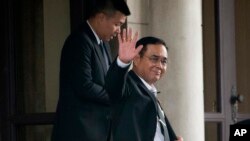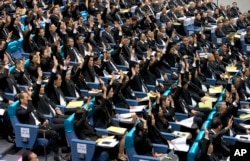Thailand's Parliament voted to return 2014 coup-leader Prayuth Chan-ocha to the prime minister's post on Wednesday, entrenching the military's political power after elections in March that many hoped would set the country on a more democratic path.
With Prayuth's win, "the screws are grinding towards a much more pseudo-democracy in Thailand," said Paul Chambers, a political analyst and lecturer at Thailand's Naresuan University.
The outcome of the vote, tilted heavily in Prayuth's favor, came as little surprise.
The ex-general was all but guaranteed the support of a Senate wholly appointed by the military regime he ushered in, and of a group of "micro parties" that squeezed into the popularly elected House of Representatives owing to an unorthodox seat-allocation formula devised by the junta-appointed Election Commission. The military proxy party backing Prayuth, Palang Pracharath, also took more than a fifth of the seats in play in the March poll, which produced no clear winner.
Together, they gave Prayuth a lock well before Wednesday on a majority of the combined votes in the 500-seat lower house and 250-seat upper house needed to stay in power.
"Now it's become very, very clear that the military will remain a significant actor in Thai politics, and [that] Thai politics will be dominated by the military," said Titipol Phakdeewanich, dean of the political science faculty at Ubon Ratchathani University.
"Thailand is turning into a kind of military state," he added, predicting more of the lawsuits against regime critics that defined the past five years. "We can't call this democracy."
The military regime the junta set up after the coup, the National Council for Peace and Order, is to dissolve after Prayuth's new cabinet takes office, officially restoring civilian rule. But Titipol said it will effectively live on in all but name, thanks in large measure to the new Senate.
More than a third of the people the junta appointed last month to refill the upper house have either police or military backgrounds, including Prayuth's brother, and over a dozen of them served in his last cabinet.
The new Constitution the junta midwived while in charge also gave that Senate the power for the first time to join the lower house in Wednesday's vote for prime minister, letting the military place a heavy hand on the scale.
"The Senate house is not actually ensuring the checks-and-balance system, but it is actually ensuring the control of the military in Thai politics," Titipol said.
Further cementing the military's advantage, the new charter allowed Prayuth to be nominated for prime minister without winning an elected seat in March and imposed an election formula that hobbled the military's main opponent at the polls, the anti-junta Pheu Thai party.
Even so, many pundits predict that Prayuth's government may find it hard to actually govern.
The coalition or 19 parties Palang Pracharath has cobbled together has only a razor-thin majority in the lower house to pass bills with. It spent the weeks leading up to Wednesday's vote wooing allies with the promise of senior cabinet posts.
Titipol thinks the coalition could prove robust. With coveted posts secured — and the government powers and budgets to go with them — he said the partners will be loath to break ranks and risk collapse.
"When they have this mutual interest, I think they want to ensure that they can stay in power as long as they can. I don't think that they would kill each other," he said.
But rather than take that risk, Chambers said Prayuth will likely call on a beholden Senate to join the lower house in voting on key bills when possible and lean heavily on either royal decrees or those the junta handed down over the last five years.
He said those tactics could gradually chip away at what popular support he has. That could help Pheu Thai and its own allies, who control nearly half the lower house as it is, persuade enough "cobra" MPs in the government coalition to vote with them against Prayuth on occasion.
"There are so many opposition MPs, plus there's a chance that you could take several cobras, that on those occasions where the Senate cannot come in to help Prayuth, then the opposition in the Parliament could win against him, and thus there would be parliamentary pandemonium," he said.
Chambers said he was even hearing echoes in Prayuth's predicament of another past junta leader.
In 1969, General Thanom Kittikacorn was pressured into calling a general election he went on to win on dubious grounds, only to overthrow his own government and wrest back supreme control two years later after repeatedly failing to get his way in Parliament.
"I can see that happening," Chambers said.
"In appearances it looks like more of the same in terms of the junta continuing in power, but just...in a different form. But on the other hand, Prayuth is going to realize very quickly that it's very difficult to govern as an elected prime minister with such a large opposition."







